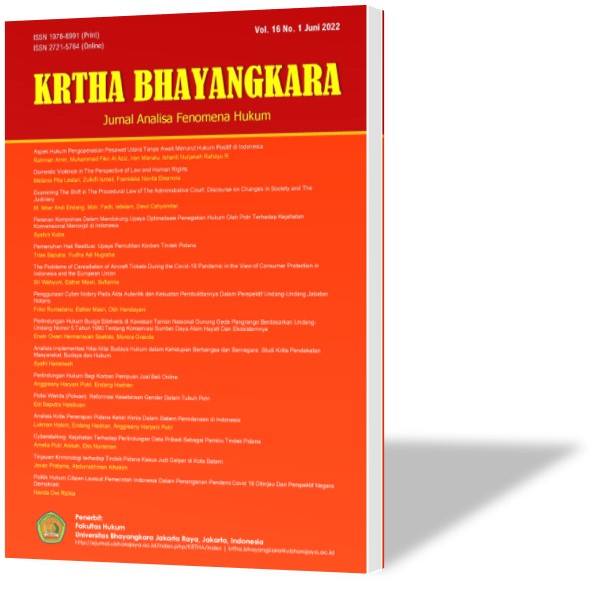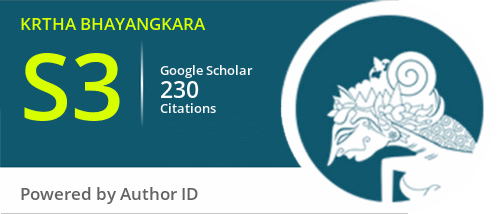Kewenangan Absolut Pengadilan Agama Dalam Penyelesaian Sengketa Ekonomi Syariah Pasca Putusan Mahkamah Konstitusi Nomor 93/PUU-X/2012
DOI:
https://doi.org/10.31599/krtha.v15i2.1122Keywords:
competency, religious court, syaria economicAbstract
After the Law Number 3 of 2006 concerning Amendments to Law Number 7 of 1989 concerning Religious Courts was ratified, the authority of the Religious Courts was expanded so as to resolve sharia economic disputes. However, ironically, Law Number 21 of 2008 concerning Islamic Banking regulates the possibility of a choice of forum (choice of forum) which Competent Court is desired by the parties to the contract, both the Religious Courts and the District Courts. As a result, in judicial practice, there are several cases of sharia economic disputes that are resolved through the general court mechanism. This research is very important to find out the authority of the Religious Courts before and after the issuance of the Constitutional Court's decision Number 93/PUU-X/2012 and its implications for the authority of the Religious Courts towards sharia banking and other sharia economic institutions. The method used in this research is a normative juridical (juridical-dogmatic) research method with a statutory and case approach. Based on the results of the study, it was found that the authority for resolving sharia economic disputes at the Religious Courts before the Constitutional Court Decision occurred dualism in the authority to adjudicate between the Religious Courts and the District Courts due to a conflict between the laws and regulations, namely Article 55 paragraph (2) of Law Number 21 of 2008 and Article 49 of Law Number 3 of 2006 and of the 1945 Constitution Article 28D paragraph (1) concerning the right of everyone to obtain rule of law. However, after the issuance of the Constitutional Court's decision Number 93/PUU-X/2012, the Religious Courts were declared as the only judicial institution authorized to resolve sharia economic disputes. This Adjudication normatively does not only have implications for Islamic banking as one of the Islamic economic institutions, but also other institutions that run their business based on sharia principles.
References
A. Buku-buku
Ahmad, Mujahidin, Prosedur Penyelesaian Sengketa Ekonomi Syariah, Bogor: Ghalia Indonesia, 2010.
Anshori, Abdul Ghofur, Peradilan Agama di Indonesia Pasca Undang-Undang No.3 Tahun 2006 (Sejarah, Kedudukan, dan Kewenangan), Yogyakarta: UII Press, 2007
Fuady, Munir, Teori Negara Hukum Moderen (Rechstaat), Bandung: Refika Aditama, 2009
Harahap, M. Yahya, Pembahasan Permasalahan dan Penerapan KUHAP, Jakarta: Sinar Grafika, 2001
_________________, Hukum Acara Perdata, Jakarta: Sinar Grafika, 2017
KRTHA BHAYANGKARA | Volume 15 Number 2, December 2021
Ahmad Baihaki, M. Rizhan Budi Prasetya 307
Hermansyah, Hukum Perbankan Nasional Indonesia, Jakarta, Kencana Media Group, 2005, Cet. ke-4
Sudikno Mertokusumo dan A.Pitlo, Penemuan Hukum, Bandung: Citra Aditya Bakti, 1993
Mertokusumo, Sudikno, Penemuan Hukum Sebuah Pengantar, Yogyakarta: Penerbit Liberty, 2006.
Rahardjo, Satjipto, Ilmu Hukum, Bandung : Penerbit PT. Citra Aditya Bakti, 2000
Rodiyah, Teknik Perundang-undangan, Semarang: Badan Penerbit Universitas Diponegoro, 2000
Sjarif, Amiroedin, Perundang-undangan Dasar; Jenis dan Teknik Membuatnya, Jakarta: Rineka Cipta, 1997.
Tim Penyusun, Hukum Acara Mahkamah Konstitusi, Jakarta: Sekretariat Jenderal dan Kepaniteraan MKRI, 2010
Yuliandri, Asas-asas Pembentukan Peraturan Perundangan Yang Baik: Gagasan pembentukan Undang-Undang Bekelanjutan, Jakarta: Raja Grafindo Persada, 2011 B. Peraturan Perundang-undangan
Indonesia, Undang-Undang Nomor 10 Tahun 1998 tentang Perubahan Atas Undang-Undang Nomor 7 Tahun 1992 tentang Perbankan
, Undang-Undang Republik Indonesia Nomor 3 Tahun 2006 tentang Perubahan Atas Undang-Undang Nomor 7 Tahun 1989 tentang Peradilan Agama
, Undang-Undang Nomor 21 Tahun 2008 tentang Perbankan Syariah.
, Undang-Undang Republik Indonesia Nomor 50 Tahun 2009 tentang Perubahan Kedua Atas Undang-Undang Nomor 7 Tahun 1989 tentang Peradilan Agama.
, Undang-Undang Republik Indonesia tentang Mahkamah Konstitusi, UU No. 8 Tahun 2011.
, Peraturan Mahkamah Agung Nomor 2 Tahun 2008 tentang Kompilasi Hukum Ekonomi Syariah.
, Peraturan Mahkamah Agung Nomor 14 Tahun 2016 tentang Tata Cara Penyelesaian Perkara Ekonomi Syariah. Putusan Mahkamah Konstitusi Nomor 93/PUU-X/2012, Tanggal 29 Agustus 2013 C. Jurnal
Samsudin, Titin, “Peranan Hakim dalam Penemuan Hukum”, Jurnal Al-Mizan, Volume 10, Nomor 1, 2014.
KRTHA BHAYANGKARA | Volume 15 Number 2, December 2021
Kewenangan Absolut Pengadilan Agama Dalam Penyelesaian Sengketa…
Manan, Abdul, “Penyelesaian Sengketa Ekonomi Syariah, Sebuah Kewenangan Baru Peradilan Agama”, dalam Mimbar Hukum, Pusat Pengembangan Hukum Islam dan Masyarakat Madani (PPHIMM).
Permana, Sugiri. “Kedudukan Undang-undang dan Perjanjian Dalam Menentukan Penyelesaian Sengketa Perbankan Syariah Oleh Peradilan Agama”, Makalah Peradilan Umum dan Lembaga Non Litigasi.
Nurhapsari, Nindya Febrina & Rani Apriani. (2021). Penyelesaian Antara Nasabah dan Pihak Bank Perkreditan Rakyat (BPR) Dalam Perkara Tunggakan Pembayaran Kredit. KRTHA BHAYANGKARA, 15(1). https://doi.org/10.31599/krtha.v15i1.568
Yah Faniyah, & Azhari. (2020). Pelaksanaan Prinsip Syariah Dalam Memberdayakan Usaha Mikro Dan Kecil Pada Koperasi Jasa Keuangan Syariah Baitul Maal Wat Tamwil (Kjks-Bmt) Sejahtera Padang. Jurnal Hukum Sasana, 5(2). https://doi.org/10.31599/sasana.v5i2.97
Napitupulu, H. . (2020). Voluntary Bankruptcy Petition (Pailit Diri Sendiri) Perseroan Terbatas (PT) Dalam Perspektif Prinsip/Asas Commercial Exit from Financial Distress. Krtha Bhayangkara, 14(1). https://doi.org/10.31599/krtha.v14i1.37
D. Internet dan lain-lain
Otoritas Jasa Keuangan, “Perbankan Syariah dan Kelembagaannya”, terdapat disitus https://www.ojk.go.id/id/kanal/syariah/tentang-syariah/Pages/PBS-dan-Kelembagaan.aspx, diakses pada tanggal 04 Juli 2020, pukul 18.30 Wib.




































